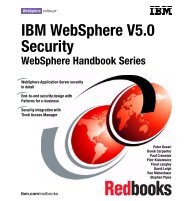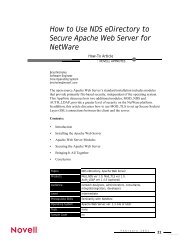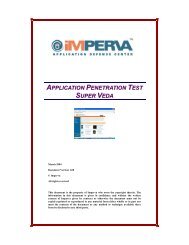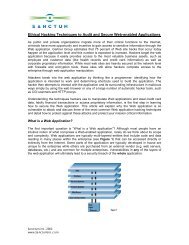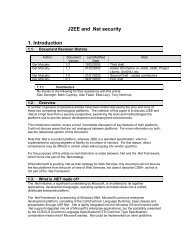- Page 1:
Improving WebApplication SecurityTh
- Page 4 and 5:
Information in this document, inclu
- Page 6 and 7:
viImproving Web Application Securit
- Page 8 and 9:
viiiImproving Web Application Secur
- Page 10 and 11:
xImproving Web Application Security
- Page 12 and 13:
xiiImproving Web Application Securi
- Page 14 and 15:
xivImproving Web Application Securi
- Page 16 and 17:
xviImproving Web Application Securi
- Page 18 and 19:
xviiiImproving Web Application Secu
- Page 20 and 21:
xxImproving Web Application Securit
- Page 22 and 23:
xxiiImproving Web Application Secur
- Page 27 and 28:
Contents xxvii.NET Remoting Securit
- Page 29 and 30:
Contents xxixStaying Secure (contin
- Page 31 and 32:
Contents xxxiASP.NET Architecture o
- Page 33 and 34:
Contents xxxiiiSummary ............
- Page 35 and 36:
Contents xxxvIndex of Checklists 68
- Page 37 and 38:
Contents xxxviiChecklistSecuring Da
- Page 39 and 40:
Contents xxxixHow ToIndex 743How To
- Page 41 and 42:
Contents xliRestricting Server-to-S
- Page 43 and 44:
ForewordsForeword by Mark CurpheyWh
- Page 45 and 46:
Forewords xlvForeword by Joel Scamb
- Page 47:
Forewords xlviiFinally, techniques
- Page 50 and 51:
lImproving Web Application Security
- Page 52 and 53:
liiImproving Web Application Securi
- Page 54 and 55:
livImproving Web Application Securi
- Page 56 and 57:
lviImproving Web Application Securi
- Page 58 and 59:
lviiiImproving Web Application Secu
- Page 60 and 61:
lxImproving Web Application Securit
- Page 62 and 63:
lxiiImproving Web Application Secur
- Page 64 and 65:
lxivImproving Web Application Secur
- Page 66 and 67:
lxviImproving Web Application Secur
- Page 68 and 69:
lxviiiImproving Web Application Sec
- Page 70 and 71:
lxxImproving Web Application Securi
- Page 72 and 73:
lxxiiImproving Web Application Secu
- Page 75 and 76:
Fast Track — How To Implementthe
- Page 77 and 78:
Fast Track — How To Implement the
- Page 79 and 80:
Fast Track — How To Implement the
- Page 81 and 82:
Fast Track — How To Implement the
- Page 83 and 84:
Fast Track — How To Implement the
- Page 85:
Part IIntroduction to Threats andCo
- Page 88 and 89:
4 Part I: Introduction to Threats a
- Page 90 and 91:
6 Part I: Introduction to Threats a
- Page 92 and 93:
8 Part I: Introduction to Threats a
- Page 94 and 95:
10 Part I: Introduction to Threats
- Page 96 and 97:
12 Part I: Introduction to Threats
- Page 98 and 99:
14 Part I: Introduction to Threats
- Page 100 and 101:
16 Part I: Introduction to Threats
- Page 102 and 103:
18 Part I: Introduction to Threats
- Page 104 and 105:
20 Part I: Introduction to Threats
- Page 106 and 107:
22 Part I: Introduction to Threats
- Page 108 and 109:
24 Part I: Introduction to Threats
- Page 110 and 111:
26 Part I: Introduction to Threats
- Page 112 and 113:
28 Part I: Introduction to Threats
- Page 114 and 115:
30 Part I: Introduction to Threats
- Page 116 and 117:
32 Part I: Introduction to Threats
- Page 118 and 119:
34 Part I: Introduction to Threats
- Page 120 and 121:
36 Part I: Introduction to Threats
- Page 122 and 123:
38 Part I: Introduction to Threats
- Page 124 and 125:
40 Part I: Introduction to Threats
- Page 126 and 127:
42 Part I: Introduction to Threats
- Page 129 and 130:
3Threat ModelingIn This Chapter●
- Page 131 and 132:
Chapter 3: Threat Modeling 47Threat
- Page 133 and 134:
Chapter 3: Threat Modeling 49Archit
- Page 135 and 136:
Chapter 3: Threat Modeling 51Figure
- Page 137 and 138:
Chapter 3: Threat Modeling 53Identi
- Page 139 and 140:
Chapter 3: Threat Modeling 55Docume
- Page 141 and 142:
Chapter 3: Threat Modeling 57●●
- Page 143 and 144:
Chapter 3: Threat Modeling 59●●
- Page 145 and 146:
Chapter 3: Threat Modeling 61Note I
- Page 147 and 148:
Chapter 3: Threat Modeling 63Risk =
- Page 149 and 150:
Chapter 3: Threat Modeling 65Table
- Page 151:
Part IIDesigning SecureWeb Applicat
- Page 154 and 155:
70 Part II: Designing Secure Web Ap
- Page 156 and 157:
72 Part II: Designing Secure Web Ap
- Page 158 and 159:
74 Part II: Designing Secure Web Ap
- Page 160 and 161:
76 Part II: Designing Secure Web Ap
- Page 162 and 163:
78 Part II: Designing Secure Web Ap
- Page 164 and 165:
80 Part II: Designing Secure Web Ap
- Page 166 and 167:
82 Part II: Designing Secure Web Ap
- Page 168 and 169:
84 Part II: Designing Secure Web Ap
- Page 170 and 171:
86 Part II: Designing Secure Web Ap
- Page 172 and 173:
88 Part II: Designing Secure Web Ap
- Page 174 and 175:
90 Part II: Designing Secure Web Ap
- Page 176 and 177:
92 Part II: Designing Secure Web Ap
- Page 178 and 179:
94 Part II: Designing Secure Web Ap
- Page 180 and 181:
96 Part II: Designing Secure Web Ap
- Page 182 and 183:
98 Part II: Designing Secure Web Ap
- Page 184 and 185:
100 Part II:Designing Secure Web Ap
- Page 186 and 187:
102 Part II:Designing Secure Web Ap
- Page 188 and 189:
104 Part II:Designing Secure Web Ap
- Page 190 and 191:
106 Part II:Designing Secure Web Ap
- Page 192 and 193:
108 Part II:Designing Secure Web Ap
- Page 194 and 195:
110 Part II:Designing Secure Web Ap
- Page 196 and 197:
112 Part II:Designing Secure Web Ap
- Page 198 and 199:
114 Part II:Designing Secure Web Ap
- Page 200 and 201:
116 Part II:Designing Secure Web Ap
- Page 202 and 203:
118 Part II:Designing Secure Web Ap
- Page 204 and 205:
120 Part II:Designing Secure Web Ap
- Page 206 and 207:
122 Part II:Designing Secure Web Ap
- Page 208 and 209:
124 Part II:Designing Secure Web Ap
- Page 211:
Part IIIBuilding Secure WebApplicat
- Page 214 and 215:
130 Part III: Building Secure Web A
- Page 216 and 217:
132 Part III: Building Secure Web A
- Page 218 and 219:
134 Part III: Building Secure Web A
- Page 220 and 221:
136 Part III: Building Secure Web A
- Page 222 and 223:
138 Part III: Building Secure Web A
- Page 224 and 225:
140 Part III: Building Secure Web A
- Page 226 and 227:
142 Part III: Building Secure Web A
- Page 228 and 229:
144 Part III: Building Secure Web A
- Page 230 and 231:
146 Part III: Building Secure Web A
- Page 232 and 233:
148 Part III: Building Secure Web A
- Page 234 and 235:
150 Part III: Building Secure Web A
- Page 236 and 237:
152 Part III: Building Secure Web A
- Page 238 and 239:
154 Part III: Building Secure Web A
- Page 240 and 241:
156 Part III: Building Secure Web A
- Page 242 and 243:
158 Part III: Building Secure Web A
- Page 244 and 245:
160 Part III: Building Secure Web A
- Page 246 and 247:
162 Part III: Building Secure Web A
- Page 248 and 249:
164 Part III: Building Secure Web A
- Page 250 and 251:
166 Part III: Building Secure Web A
- Page 252 and 253:
168 Part III: Building Secure Web A
- Page 254 and 255:
170 Part III: Building Secure Web A
- Page 256 and 257:
172 Part III: Building Secure Web A
- Page 258 and 259:
174 Part III: Building Secure Web A
- Page 260 and 261:
176 Part III: Building Secure Web A
- Page 262 and 263:
178 Part III: Building Secure Web A
- Page 265 and 266:
8Code Access Security in PracticeIn
- Page 267 and 268:
Chapter 8: Code Access Security in
- Page 269 and 270:
Chapter 8: Code Access Security in
- Page 271 and 272:
Chapter 8: Code Access Security in
- Page 273 and 274:
Chapter 8: Code Access Security in
- Page 275 and 276:
Chapter 8: Code Access Security in
- Page 277 and 278:
Chapter 8: Code Access Security in
- Page 279 and 280:
Chapter 8: Code Access Security in
- Page 281 and 282:
Chapter 8: Code Access Security in
- Page 283 and 284:
Chapter 8: Code Access Security in
- Page 285 and 286:
Chapter 8: Code Access Security in
- Page 287 and 288:
Chapter 8: Code Access Security in
- Page 289 and 290:
Chapter 8: Code Access Security in
- Page 291 and 292:
Chapter 8: Code Access Security in
- Page 293 and 294:
Chapter 8: Code Access Security in
- Page 295 and 296:
Chapter 8: Code Access Security in
- Page 297 and 298:
Chapter 8: Code Access Security in
- Page 299 and 300:
Chapter 8: Code Access Security in
- Page 301 and 302:
Chapter 8: Code Access Security in
- Page 303:
Chapter 8: Code Access Security in
- Page 306 and 307:
222 Part III: Building Secure Web A
- Page 308 and 309:
224 Part III: Building Secure Web A
- Page 310 and 311:
226 Part III: Building Secure Web A
- Page 312 and 313:
228 Part III: Building Secure Web A
- Page 314 and 315:
230 Part III: Building Secure Web A
- Page 316 and 317:
232 Part III: Building Secure Web A
- Page 318 and 319:
234 Part III: Building Secure Web A
- Page 320 and 321:
236 Part III: Building Secure Web A
- Page 322 and 323:
238 Part III: Building Secure Web A
- Page 324 and 325:
240 Part III: Building Secure Web A
- Page 326 and 327:
242 Part III: Building Secure Web A
- Page 328 and 329:
244 Part III: Building Secure Web A
- Page 330 and 331:
246 Part III: Building Secure Web A
- Page 332 and 333:
248 Part III: Building Secure Web A
- Page 334 and 335:
250 Part III: Building Secure Web A
- Page 336 and 337:
252 Part III: Building Secure Web A
- Page 338 and 339:
254 Part III: Building Secure Web A
- Page 340 and 341:
256 Part III: Building Secure Web A
- Page 342 and 343:
258 Part III: Building Secure Web A
- Page 344 and 345:
260 Part III: Building Secure Web A
- Page 346 and 347:
262 Part III: Building Secure Web A
- Page 348 and 349:
264 Part III: Building Secure Web A
- Page 350 and 351:
266 Part III: Building Secure Web A
- Page 352 and 353:
268 Part III: Building Secure Web A
- Page 354 and 355:
270 Part III: Building Secure Web A
- Page 356 and 357:
272 Part III: Building Secure Web A
- Page 358 and 359:
274 Part III: Building Secure Web A
- Page 360 and 361:
276 Part III: Building Secure Web A
- Page 362 and 363:
278 Part III: Building Secure Web A
- Page 364 and 365:
280 Part III: Building Secure Web A
- Page 366 and 367:
282 Part III: Building Secure Web A
- Page 368 and 369:
284 Part III: Building Secure Web A
- Page 370 and 371:
286 Part III: Building Secure Web A
- Page 372 and 373:
288 Part III: Building Secure Web A
- Page 374 and 375:
290 Part III: Building Secure Web A
- Page 376 and 377:
292 Part III: Building Secure Web A
- Page 378 and 379:
294 Part III: Building Secure Web A
- Page 380 and 381:
296 Part III: Building Secure Web A
- Page 383 and 384:
11Building Secure ServicedComponent
- Page 385 and 386:
Chapter 11: Building Secure Service
- Page 387 and 388:
Chapter 11: Building Secure Service
- Page 389 and 390:
Chapter 11: Building Secure Service
- Page 391 and 392:
Chapter 11: Building Secure Service
- Page 393 and 394:
Chapter 11: Building Secure Service
- Page 395 and 396:
Chapter 11: Building Secure Service
- Page 397 and 398:
Chapter 11: Building Secure Service
- Page 399 and 400:
Chapter 11: Building Secure Service
- Page 401:
Chapter 11: Building Secure Service
- Page 404 and 405:
320 Part III: Building Secure Web A
- Page 406 and 407:
322 Part III: Building Secure Web A
- Page 408 and 409:
324 Part III: Building Secure Web A
- Page 410 and 411:
326 Part III: Building Secure Web A
- Page 412 and 413:
328 Part III: Building Secure Web A
- Page 414 and 415:
330 Part III: Building Secure Web A
- Page 416 and 417:
332 Part III: Building Secure Web A
- Page 418 and 419:
334 Part III: Building Secure Web A
- Page 420 and 421:
336 Part III: Building Secure Web A
- Page 422 and 423:
338 Part III: Building Secure Web A
- Page 424 and 425:
340 Part III: Building Secure Web A
- Page 426 and 427:
342 Part III: Building Secure Web A
- Page 428 and 429:
344 Part III: Building Secure Web A
- Page 430 and 431:
346 Part III: Building Secure Web A
- Page 432 and 433:
348 Part III: Building Secure Web A
- Page 434 and 435:
350 Part III: Building Secure Web A
- Page 436 and 437:
352 Part III: Building Secure Web A
- Page 438 and 439:
354 Part III: Building Secure Web A
- Page 440 and 441:
356 Part III: Building Secure Web A
- Page 442 and 443:
358 Part III: Building Secure Web A
- Page 444 and 445:
360 Part III: Building Secure Web A
- Page 446 and 447:
362 Part III: Building Secure Web A
- Page 448 and 449:
364 Part III: Building Secure Web A
- Page 450 and 451:
366 Part III: Building Secure Web A
- Page 452 and 453:
368 Part III: Building Secure Web A
- Page 454 and 455:
370 Part III: Building Secure Web A
- Page 456 and 457:
372 Part III: Building Secure Web A
- Page 458 and 459:
374 Part III: Building Secure Web A
- Page 460 and 461:
376 Part III: Building Secure Web A
- Page 462 and 463:
378 Part III: Building Secure Web A
- Page 464 and 465:
380 Part III: Building Secure Web A
- Page 466 and 467:
382 Part III: Building Secure Web A
- Page 468 and 469:
384 Part III: Building Secure Web A
- Page 470 and 471:
386 Part III: Building Secure Web A
- Page 472 and 473:
388 Part III: Building Secure Web A
- Page 474 and 475:
390 Part III: Building Secure Web A
- Page 476 and 477:
392 Part III: Building Secure Web A
- Page 478 and 479:
394 Part III: Building Secure Web A
- Page 480 and 481:
396 Part III: Building Secure Web A
- Page 482 and 483:
398 Part III: Building Secure Web A
- Page 485:
Part IVSecuring Your Network,Host,
- Page 488 and 489:
404 Part IV: Securing Your Network,
- Page 490 and 491:
406 Part IV: Securing Your Network,
- Page 492 and 493:
408 Part IV: Securing Your Network,
- Page 494 and 495:
410 Part IV: Securing Your Network,
- Page 496 and 497:
412 Part IV: Securing Your Network,
- Page 498 and 499:
414 Part IV: Securing Your Network,
- Page 500 and 501:
416 Part IV: Securing Your Network,
- Page 502 and 503:
418 Part IV: Securing Your Network,
- Page 504 and 505:
420 Part IV: Securing Your Network,
- Page 506 and 507:
422 Part IV: Securing Your Network,
- Page 508 and 509:
424 Part IV: Securing Your Network,
- Page 510 and 511:
426 Part IV: Securing Your Network,
- Page 512 and 513:
428 Part IV: Securing Your Network,
- Page 514 and 515:
430 Part IV: Securing Your Network,
- Page 516 and 517:
432 Part IV: Securing Your Network,
- Page 518 and 519:
434 Part IV: Securing Your Network,
- Page 520 and 521:
436 Part IV: Securing Your Network,
- Page 522 and 523:
438 Part IV: Securing Your Network,
- Page 524 and 525:
440 Part IV: Securing Your Network,
- Page 526 and 527:
442 Part IV: Securing Your Network,
- Page 528 and 529:
444 Part IV: Securing Your Network,
- Page 530 and 531:
446 Part IV: Securing Your Network,
- Page 532 and 533:
448 Part IV: Securing Your Network,
- Page 534 and 535:
450 Part IV: Securing Your Network,
- Page 536 and 537:
452 Part IV: Securing Your Network,
- Page 538 and 539:
454 Part IV: Securing Your Network,
- Page 540 and 541:
456 Part IV: Securing Your Network,
- Page 542 and 543:
458 Part IV: Securing Your Network,
- Page 544 and 545:
460 Part IV: Securing Your Network,
- Page 546 and 547:
462 Part IV: Securing Your Network,
- Page 548 and 549:
464 Part IV: Securing Your Network,
- Page 550 and 551: 466 Part IV: Securing Your Network,
- Page 552 and 553: 468 Part IV: Securing Your Network,
- Page 554 and 555: 470 Part IV: Securing Your Network,
- Page 556 and 557: 472 Part IV: Securing Your Network,
- Page 558 and 559: 474 Part IV: Securing Your Network,
- Page 560 and 561: 476 Part IV: Securing Your Network,
- Page 562 and 563: 478 Part IV: Securing Your Network,
- Page 564 and 565: 480 Part IV: Securing Your Network,
- Page 566 and 567: 482 Part IV: Securing Your Network,
- Page 568 and 569: 484 Part IV: Securing Your Network,
- Page 570 and 571: 486 Part IV: Securing Your Network,
- Page 572 and 573: 488 Part IV: Securing Your Network,
- Page 574 and 575: 490 Part IV: Securing Your Network,
- Page 576 and 577: 492 Part IV: Securing Your Network,
- Page 578 and 579: 494 Part IV: Securing Your Network,
- Page 580 and 581: 496 Part IV: Securing Your Network,
- Page 582 and 583: 498 Part IV: Securing Your Network,
- Page 585 and 586: 18Securing Your Database ServerIn T
- Page 587 and 588: Chapter 18: Securing Your Database
- Page 589 and 590: Chapter 18: Securing Your Database
- Page 591 and 592: Chapter 18: Securing Your Database
- Page 593 and 594: Chapter 18: Securing Your Database
- Page 595 and 596: Chapter 18: Securing Your Database
- Page 597 and 598: Chapter 18: Securing Your Database
- Page 599: Chapter 18: Securing Your Database
- Page 603 and 604: Chapter 18: Securing Your Database
- Page 605 and 606: Chapter 18: Securing Your Database
- Page 607 and 608: Chapter 18: Securing Your Database
- Page 609 and 610: Chapter 18: Securing Your Database
- Page 611 and 612: Chapter 18: Securing Your Database
- Page 613 and 614: Chapter 18: Securing Your Database
- Page 615 and 616: Chapter 18: Securing Your Database
- Page 617 and 618: Chapter 18: Securing Your Database
- Page 619 and 620: Chapter 18: Securing Your Database
- Page 621 and 622: Chapter 18: Securing Your Database
- Page 623 and 624: Chapter 18: Securing Your Database
- Page 625: Chapter 18: Securing Your Database
- Page 628 and 629: 544 Part IV: Securing Your Network,
- Page 630 and 631: 546 Part IV: Securing Your Network,
- Page 632 and 633: 548 Part IV: Securing Your Network,
- Page 634 and 635: 550 Part IV: Securing Your Network,
- Page 636 and 637: 552 Part IV: Securing Your Network,
- Page 638 and 639: 554 Part IV: Securing Your Network,
- Page 640 and 641: 556 Part IV: Securing Your Network,
- Page 642 and 643: 558 Part IV: Securing Your Network,
- Page 644 and 645: 560 Part IV: Securing Your Network,
- Page 646 and 647: 562 Part IV: Securing Your Network,
- Page 648 and 649: 564 Part IV: Securing Your Network,
- Page 650 and 651:
566 Part IV: Securing Your Network,
- Page 652 and 653:
568 Part IV: Securing Your Network,
- Page 654 and 655:
570 Part IV: Securing Your Network,
- Page 656 and 657:
572 Part IV: Securing Your Network,
- Page 658 and 659:
574 Part IV: Securing Your Network,
- Page 660 and 661:
576 Part IV: Securing Your Network,
- Page 662 and 663:
578 Part IV: Securing Your Network,
- Page 664 and 665:
580 Part IV: Securing Your Network,
- Page 666 and 667:
582 Part IV: Securing Your Network,
- Page 668 and 669:
584 Part IV: Securing Your Network,
- Page 670 and 671:
586 Part IV: Securing Your Network,
- Page 672 and 673:
588 Part IV: Securing Your Network,
- Page 674 and 675:
590 Part IV: Securing Your Network,
- Page 676 and 677:
592 Part IV: Securing Your Network,
- Page 678 and 679:
594 Part IV: Securing Your Network,
- Page 680 and 681:
596 Part IV: Securing Your Network,
- Page 682 and 683:
598 Part IV: Securing Your Network,
- Page 684 and 685:
600 Part IV: Securing Your Network,
- Page 686 and 687:
602 Part IV: Securing Your Network,
- Page 689 and 690:
21Code ReviewIn This Chapter●●
- Page 691 and 692:
Chapter 21: Code Review 607For exam
- Page 693 and 694:
Chapter 21: Code Review 609Identify
- Page 695 and 696:
Chapter 21: Code Review 611Check to
- Page 697 and 698:
Chapter 21: Code Review 613Check th
- Page 699 and 700:
Chapter 21: Code Review 615Buffer O
- Page 701 and 702:
Chapter 21: Code Review 617Is Your
- Page 703 and 704:
Chapter 21: Code Review 619●Does
- Page 705 and 706:
Chapter 21: Code Review 621Do You S
- Page 707 and 708:
Chapter 21: Code Review 623The foll
- Page 709 and 710:
Chapter 21: Code Review 625●Do yo
- Page 711 and 712:
Chapter 21: Code Review 627●Do yo
- Page 713 and 714:
Chapter 21: Code Review 629●●Is
- Page 715 and 716:
Chapter 21: Code Review 631Do You V
- Page 717 and 718:
Chapter 21: Code Review 633Do You S
- Page 719 and 720:
Chapter 21: Code Review 635Do You E
- Page 721 and 722:
Chapter 21: Code Review 637Check th
- Page 723 and 724:
Chapter 21: Code Review 639Do You P
- Page 725 and 726:
Chapter 21: Code Review 641Search f
- Page 727 and 728:
22Deployment ReviewIn This Chapter
- Page 729 and 730:
Chapter 22: Deployment Review 645Pa
- Page 731 and 732:
Chapter 22: Deployment Review 647
- Page 733 and 734:
Chapter 22: Deployment Review 649
- Page 735 and 736:
Chapter 22: Deployment Review 651Re
- Page 737 and 738:
Chapter 22: Deployment Review 653Fo
- Page 739 and 740:
Chapter 22: Deployment Review 655Pa
- Page 741 and 742:
Chapter 22: Deployment Review 657Ma
- Page 743 and 744:
Chapter 22: Deployment Review 659
- Page 745 and 746:
Chapter 22: Deployment Review 661Th
- Page 747 and 748:
Chapter 22: Deployment Review 663Th
- Page 749 and 750:
Chapter 22: Deployment Review 665Ac
- Page 751 and 752:
Chapter 22: Deployment Review 667
- Page 753 and 754:
Chapter 22: Deployment Review 669Ho
- Page 755 and 756:
Chapter 22: Deployment Review 671Pa
- Page 757 and 758:
Chapter 22: Deployment Review 673Fi
- Page 759 and 760:
Chapter 22: Deployment Review 675Au
- Page 761 and 762:
Chapter 22: Deployment Review 677SQ
- Page 763 and 764:
Chapter 22: Deployment Review 679
- Page 765 and 766:
Related Security ResourcesRelated M
- Page 767 and 768:
Related Security Resources 683Commu
- Page 769:
Related Security Resources 685Commo
- Page 772 and 773:
688 Improving Web Application Secur
- Page 774 and 775:
690 Improving Web Application Secur
- Page 776 and 777:
692 Improving Web Application Secur
- Page 778 and 779:
694 Improving Web Application Secur
- Page 780 and 781:
696 Improving Web Application Secur
- Page 782 and 783:
698 Improving Web Application Secur
- Page 784 and 785:
700 Improving Web Application Secur
- Page 786 and 787:
702 Improving Web Application Secur
- Page 788 and 789:
704 Improving Web Application Secur
- Page 790 and 791:
706 Improving Web Application Secur
- Page 793 and 794:
Checklist:Securing Enterprise Servi
- Page 795:
Checklist: Securing Enterprise Serv
- Page 798 and 799:
714 Improving Web Application Secur
- Page 801 and 802:
Checklist:Securing Data AccessHow t
- Page 803:
Checklist: Securing Data Access 719
- Page 806 and 807:
722 Improving Web Application Secur
- Page 808 and 809:
724 Improving Web Application Secur
- Page 810 and 811:
726 Improving Web Application Secur
- Page 812 and 813:
728 Improving Web Application Secur
- Page 814 and 815:
730 Improving Web Application Secur
- Page 816 and 817:
732 Improving Web Application Secur
- Page 819 and 820:
Checklist:Security Review for Manag
- Page 821 and 822:
Checklist: Security Review for Mana
- Page 823 and 824:
Checklist: Security Review for Mana
- Page 825:
Checklist: Security Review for Mana
- Page 829 and 830:
How To:Implement Patch ManagementAp
- Page 831 and 832:
How To: Implement Patch Management
- Page 833 and 834:
How To: Implement Patch Management
- Page 835 and 836:
How To: Implement Patch Management
- Page 837 and 838:
How To: Implement Patch Management
- Page 839 and 840:
How To:Harden the TCP/IP StackAppli
- Page 841 and 842:
How To: Harden the TCP/IP Stack 757
- Page 843 and 844:
How To: Harden the TCP/IP Stack 759
- Page 845 and 846:
How To: Harden the TCP/IP Stack 761
- Page 847:
How To: Harden the TCP/IP Stack 763
- Page 850 and 851:
766 Improving Web Application Secur
- Page 852 and 853:
768 Improving Web Application Secur
- Page 854 and 855:
770 Improving Web Application Secur
- Page 856 and 857:
772 Improving Web Application Secur
- Page 858 and 859:
774 Improving Web Application Secur
- Page 861 and 862:
How To:Use IPSec for Filtering Port
- Page 863 and 864:
How To: Use IPSec for Filtering Por
- Page 865 and 866:
How To: Use IPSec for Filtering Por
- Page 867 and 868:
How To: Use IPSec for Filtering Por
- Page 869 and 870:
How To: Use IPSec for Filtering Por
- Page 871 and 872:
How To:Use the Microsoft BaselineSe
- Page 873 and 874:
How To: Use the Microsoft Baseline
- Page 875 and 876:
How To: Use the Microsoft Baseline
- Page 877:
How To: Use the Microsoft Baseline
- Page 880 and 881:
796 Improving Web Application Secur
- Page 882 and 883:
798 Improving Web Application Secur
- Page 885 and 886:
How To:Use URLScanApplies ToSummary
- Page 887 and 888:
How To: Use URLScan 803Throttling R
- Page 889 and 890:
How To:Create a CustomEncryption Pe
- Page 891 and 892:
How To: Create a Custom Encryption
- Page 893 and 894:
How To: Create a Custom Encryption
- Page 895 and 896:
How To: Create a Custom Encryption
- Page 897 and 898:
How To: Create a Custom Encryption
- Page 899 and 900:
How To: Create a Custom Encryption
- Page 901 and 902:
How To: Create a Custom Encryption
- Page 903 and 904:
How To: Create a Custom Encryption
- Page 905 and 906:
How To: Create a Custom Encryption
- Page 907 and 908:
How To:Use Code Access Security Pol
- Page 909 and 910:
How To: Use Code Access Security Po
- Page 911 and 912:
How To: Use Code Access Security Po
- Page 913 and 914:
How To: Use Code Access Security Po
- Page 915:
How To: Use Code Access Security Po
- Page 918 and 919:
patterns & practicesProven practice



